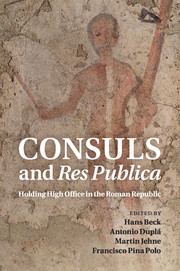Book contents
- Frontmatter
- Contents
- Preface
- Contributors
- The republic and its highest office: some introductory remarks on the Roman consulate
- Part I The creation of the consulship
- Part II Powers and functions of the consulship
- Part III Symbols, models, self-representation
- Part IV Ideology, confrontation and the end of the republican consulship
- Bibliography
- Index of persons
- Subject index
- References
The republic and its highest office: some introductory remarks on the Roman consulate
Published online by Cambridge University Press: 07 September 2011
- Frontmatter
- Contents
- Preface
- Contributors
- The republic and its highest office: some introductory remarks on the Roman consulate
- Part I The creation of the consulship
- Part II Powers and functions of the consulship
- Part III Symbols, models, self-representation
- Part IV Ideology, confrontation and the end of the republican consulship
- Bibliography
- Index of persons
- Subject index
- References
Summary
The consulship of the Roman republic is notoriously under-researched. To be sure, the republican “constitution,” and with it the consulate, have been addressed to a certain extent. Examples in English include Andrew Lintott's The Constitution of the Roman Republic and T. Corey Brennan's and John North's more recent syntheses. In some sense, these studies provide a comprehensive summary of a long series of scholarly contributions on the republic's institutional apparatus, starting with Theodor Mommsen's contribution and explored further in the works of Ettore de Ruggiero, Francesco de Martino, Jochen Bleicken, Wolfgang Kunkel and Roland Wittmann. This scholarship deals with the Roman “constitution” in general terms, and all of these essays focus, more or less, on the supreme magistracy in the republic. Furthermore, the consulship has been studied in research on Roman chronology and on the Roman nobility. Republican prosopography is roughly based on the Fasti Consulares as a starting point. In fact, without Broughton's monumental work it would be practically impossible to tackle any study on the republican period. And, of course, the groundbreaking work of Adalberto Giovannini must be mentioned. Giovannini succeeded in proving the non-existence of the assumed lex Cornelia de provinciis ordinandis, prompted by Mommsen, and specified the characteristics of the consular imperium. However, there is no book-length treatment of the office and its competences, or of the tasks performed by the consuls and their role in the government of Rome during the republic. The situation is somewhat different in other areas of constitutional research. The senate, the popular assemblies, the aedileship, the tribunate of the plebs, the censorship, the dictatorship and most recently the praetorship have all received in-depth treatment and works of analysis that were at times truly magisterial. In other words, virtually all republican institutions have, at some point, been the subject of extensive, although not completely updated, research. To date, the consulship is the only institution that has not received this attention.
- Type
- Chapter
- Information
- Consuls and Res PublicaHolding High Office in the Roman Republic, pp. 1 - 16Publisher: Cambridge University PressPrint publication year: 2011
References
- 1
- Cited by



